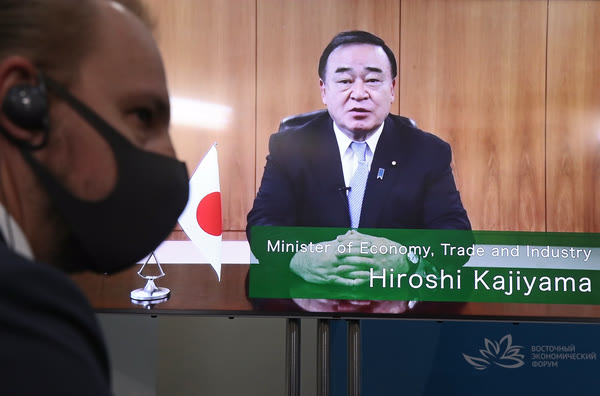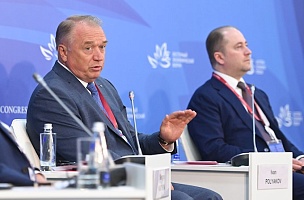KEY CONCLUSIONS
The economies of Japan and Russia are starting to recover from the pandemic; both countries are ready to continue cooperation
“The economies of Russia and Japan are recovering, and it is important that interaction is growing so actively. Now it is the time to invest, discover new markets, and develop ties between regions. We have a basis for this: trade is growing again, joint projects are being launched in a variety of sectors,” Maksim Reshetnikov, Minister of Economic Development of the Russian Federation.
“Japanese companies highly appreciate the effect of the 8-point cooperation plan. They say, there are more contacts with the Russian representatives, and it is now easier to implement projects,” Fumiya Kokubu, Chairman, Japan-Russian Committee for Economic Cooperation, Federation of Economic Organizations Keidanren; Chairman of the Board of Directors, Marubeni Corporation.
“Despite all the epidemiological restrictions, we signed service agreements with six Japanese companies. Japanese businesses are already incurring costs, which means that their intentions are real, because no business would invest without a prospect for a return on its investment,” Aleksey Khachay, General Director, Japanese Project Promotion Vehicle in the Far East.
Vostochny Port in Primorye is one of the main junctures for the development of relations between Japan and Russia
"Vostochny Port became a model for Russia–Japan business cooperation, since this excellent project benefits both countries,” Roman Trotsenko, Founder, Chairman of the Board of Directors, AEON Corporation.
“The cargo turnover of the Vostochny Port for the supply of high-quality coal to Japanese consumers is growing as well. Over the course of 2010s, the total volume of supplies reached 62 million tonnes, which is a good number. At the same time, the share of the Vostochny port in the total supplies of Russian coal to Japanese consumers is 42%, and it is growing steadily year over year,” Irina Olkhovskaya, Chief Officer for Seaport and Railway Projects, UMMC.
PROBLEMS
The economy of the Russian Far East is not sufficiently focused on Japan
"The social and economic development of Russia’s regions that are close to Japan will have a positive effect on the economic relations between the two countries, so we would like to strengthen cooperation in such areas as medicine, urban planning, agriculture, and tourism,” Masami Iijima, Chairman, Japan Association for Trade with Russia and the NIS (ROTOBO); Counselor, Mitsui & Co. Ltd.
“Why should the city of Vladivostok focus on Moscow or St. Petersburg? Vladivostok’s location is absolutely unique, and so are its opportunities in terms of climate; we should focus on San Francisco, Seoul, Tokyo. We must develop the quality of urban economy and the quality of life in cities, bringing it to international standards,” Artem Dovlatov, Deputy Chairman, Member of the Management Board, VEB.RF; General Director, VEB.DV.
The unstable business environment in Russia makes it difficult for Japanese companies to implement their projects in the country
“Businesses still complain, as they did before, about the problems with stability of the regulatory framework and unpredictable government’s response to various problems. We would like our partners on the Russian side to listen to these opinions coming from our companies,” Fumiya Kokubu, Chairman, Japan-Russian Committee for Economic Cooperation, Federation of Economic Organizations Keidanren; Chairman of the Board of Directors, Marubeni Corporation.
“I cannot but mention that our company is experiencing major difficulties, particularly with a significant increase in the cost of imported goods caused by fluctuations in the rouble exchange rate. A stable business environment is necessary,” Masayuki Sato, Chairman, Representative Director, Chief Executive Officer, JGC Holdings Corporation.
SOLUTIONS
Russia and Japan can significantly increase cooperation through the joint development of the Northern Sea Route, the Trans-Siberian Railway, and the Baikal–Amur Mainline
“In order to develop the Arctic resources, it is necessary to enhance the logistic routes that can be used to deliver the extracted resources to the sales markets. In this sense, it is expected that cooperation between Russia and Japan will advance along the lines of developing the Northern Sea Route and constructing the transshipment bases in Kamchatka and Murmansk,” Masami Iijima, Chairman, Japan Association for Trade with Russia and the NIS (ROTOBO); Counselor, Mitsui & Co. Ltd.
"With multilateral support, we would like to promote projects for the development of the eastern section of the Northern Sea Route, since it is a venture that meets the national interests of both countries,” Takeshi Hashimoto, President, Representative Director, Mitsui O.S.K. Lines Ltd.
“There is a potential for using the capacity of the Northern Sea Route and the Trans-Siberian Railway,” Maksim Reshetnikov, Minister of Economic Development of the Russian Federation.
“In the situation of a pandemic, we saw reduced air traffic, delays and congestion in seaports, and increased costs of freight. So, the focus is once again on the Trans-Siberian Railway and the Baikal–Amur Mainline. Especially after the Suez Canal situation, when the ship ran aground back in March, people started to consider alternative routes, including the overland route through Siberia. With an increase in the volume of commodity flow, the issue will inevitably be its modernization and the upgrade of the port infrastructure. This is where the countries could cooperate in a lot of ways,” Fumiya Kokubu, Chairman, Japan-Russian Committee for Economic Cooperation, Federation of Economic Organizations Keidanren; Chairman of the Board of Directors, Marubeni Corporation.
Japan may help Russia develop its electric transportation infrastructure
“We have a new technological capability developing, especially with the Japanese side. Particularly since a legislation package on the development of electric transport in the Russian Federation was adopted last week. According to the plans of the Russian government, about 10% of all cars in Russia should soon be electric. An important issue for the Russian government is to localize the technology in the country. This is an interesting point for future collaboration with Japanese companies, given that Japan has moved forward in this regard,” Vadim Shvetsov, General Director, Sollers Group.
For more information, visit the Roscongress Foundation’s Information and Analytical System at roscongress.org.






